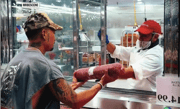The grocery staples experts warn you should avoid—are they in your cart?
- Replies 0
Grocery shopping is practically muscle memory for most of us—grab a cart, cruise the aisles, and tick off the essentials. We stock up on fresh produce, grab our favorite snacks, and trust that the items filling our carts are safe to bring home to our families. It’s a routine we rarely question, and why would we? Grocery stores are supposed to be our go-to for convenience, nutrition, and safety.
But what if that trust was misplaced? What if some of the most common items we toss into our carts every week actually pose hidden dangers? From mysterious additives to contamination risks, not everything is as straightforward as it seems…
A troubling new report suggests that the US healthcare system is heading toward a serious crisis—one that could prevent patients from receiving life-saving care.
With hospital systems worldwide already under strain, the ripple effects could extend beyond American borders.

One of the top items on Dr Darin Detwiler’s list, a former advisor to the FDA and USDA, is pre-packaged salad greens and pre-cut fruits or vegetables.
While they may be convenient, they are also among the most frequently recalled products due to contamination with E. coli and Listeria.
Ground meat and poultry are also flagged as high-risk.
Because these products are processed from multiple animals and have a larger surface area exposed to bacteria, they are more susceptible to contamination than whole cuts of meat.
Detwiler suggests choosing whole cuts and grinding them at home when possible.
For dairy lovers, raw milk and unpasteurized dairy products are particularly concerning.
The Centers for Disease Control and Prevention (CDC) reports that those who consume raw milk are 840 times more likely to contract a foodborne illness than those who choose pasteurized alternatives.
Outbreaks of E. coli, Salmonella, and Listeria have been linked to raw dairy consumption.
Another risky food item? Raw sprouts. With over 50 outbreaks tied to raw sprouts since the 1990s, experts warn that their growing process makes them highly susceptible to contamination with Salmonella and E. coli.
Seafood lovers should also be mindful when consuming raw oysters and shellfish, which can harbor harmful bacteria and norovirus.
Several recent recalls have been linked to outbreaks of foodborne illness originating from shellfish.
Additionally, Detwiler advises thoroughly cooking eggs to prevent Salmonella contamination and heating deli meats and soft cheeses before consuming them, as they are common carriers of Listeria—a bacteria particularly dangerous for pregnant women, older adults, and those with weakened immune systems.
One of the most surprising recommendations is to avoid cantaloupe.
According to Detwiler, cantaloupes have been linked to multiple deadly outbreaks over the years, making them a high-risk fruit.
In 2011, the United States experienced one of its deadliest outbreaks when contaminated cantaloupes from Jensen Farms in Colorado triggered an outbreak. The incident claimed the lives of 33 people and left 147 others seriously ill.
In addition to grocery items, Detwiler stresses the importance of paying attention to restaurant food safety ratings.
Dining at establishments with poor health inspections can significantly increase the risk of foodborne illness.
He also advises against consuming undercooked or stale foods, as improper handling or storage can lead to bacterial growth.
Foodborne illness doubled in 2024. Source: KTLA 5 / YouTube.
The surge in foodborne illnesses serves as a wake-up call for both consumers and policymakers.
Detwiler, who has dedicated his career to food safety after losing his son to E. coli in 1993, emphasizes that stronger regulations, improved industry accountability, and proactive food safety policies are necessary to prevent further outbreaks.
He warns that despite advances in technology, policy, and awareness, food safety is not improving as it should be.
His message is clear: preventative action is needed before another major outbreak forces change.
Experts say urgent action is required to prevent a full-blown healthcare crisis. Some possible solutions include:

How do you take extra precautions with your grocery shopping? Share your thoughts and tips in the comments below!
But what if that trust was misplaced? What if some of the most common items we toss into our carts every week actually pose hidden dangers? From mysterious additives to contamination risks, not everything is as straightforward as it seems…
A troubling new report suggests that the US healthcare system is heading toward a serious crisis—one that could prevent patients from receiving life-saving care.
With hospital systems worldwide already under strain, the ripple effects could extend beyond American borders.

Expert say there are everyday grocery items you should avoid. Image source: Fikri Rasyid / Unsplash.
One of the top items on Dr Darin Detwiler’s list, a former advisor to the FDA and USDA, is pre-packaged salad greens and pre-cut fruits or vegetables.
While they may be convenient, they are also among the most frequently recalled products due to contamination with E. coli and Listeria.
Ground meat and poultry are also flagged as high-risk.
Because these products are processed from multiple animals and have a larger surface area exposed to bacteria, they are more susceptible to contamination than whole cuts of meat.
Detwiler suggests choosing whole cuts and grinding them at home when possible.
For dairy lovers, raw milk and unpasteurized dairy products are particularly concerning.
The Centers for Disease Control and Prevention (CDC) reports that those who consume raw milk are 840 times more likely to contract a foodborne illness than those who choose pasteurized alternatives.
Outbreaks of E. coli, Salmonella, and Listeria have been linked to raw dairy consumption.
Another risky food item? Raw sprouts. With over 50 outbreaks tied to raw sprouts since the 1990s, experts warn that their growing process makes them highly susceptible to contamination with Salmonella and E. coli.
Seafood lovers should also be mindful when consuming raw oysters and shellfish, which can harbor harmful bacteria and norovirus.
Several recent recalls have been linked to outbreaks of foodborne illness originating from shellfish.
Additionally, Detwiler advises thoroughly cooking eggs to prevent Salmonella contamination and heating deli meats and soft cheeses before consuming them, as they are common carriers of Listeria—a bacteria particularly dangerous for pregnant women, older adults, and those with weakened immune systems.
One of the most surprising recommendations is to avoid cantaloupe.
According to Detwiler, cantaloupes have been linked to multiple deadly outbreaks over the years, making them a high-risk fruit.
In 2011, the United States experienced one of its deadliest outbreaks when contaminated cantaloupes from Jensen Farms in Colorado triggered an outbreak. The incident claimed the lives of 33 people and left 147 others seriously ill.
In addition to grocery items, Detwiler stresses the importance of paying attention to restaurant food safety ratings.
Dining at establishments with poor health inspections can significantly increase the risk of foodborne illness.
He also advises against consuming undercooked or stale foods, as improper handling or storage can lead to bacterial growth.
Foodborne illness doubled in 2024. Source: KTLA 5 / YouTube.
The surge in foodborne illnesses serves as a wake-up call for both consumers and policymakers.
Detwiler, who has dedicated his career to food safety after losing his son to E. coli in 1993, emphasizes that stronger regulations, improved industry accountability, and proactive food safety policies are necessary to prevent further outbreaks.
He warns that despite advances in technology, policy, and awareness, food safety is not improving as it should be.
His message is clear: preventative action is needed before another major outbreak forces change.
Experts say urgent action is required to prevent a full-blown healthcare crisis. Some possible solutions include:
- Preventing further hospital closures and financial collapse
- Addressing staffing shortages through better wages and working conditions
- Implementing policy changes to support hospital expansion and efficiency
Key Takeaways
- Foodborne illness-related deaths doubled in 2024, with nearly 1,400 illnesses, 487 hospitalizations, and 19 deaths reported.
- A food safety expert warns against high-risk grocery items like pre-cut salads, raw milk, ground meat, raw sprouts, and cantaloupe due to frequent contamination.
- Cooking eggs thoroughly, heating deli meats, and avoiding raw shellfish can help reduce foodborne illness risks.
- Experts stress the need for stricter food safety regulations, proactive policies, and improved industry accountability to prevent further outbreaks.
Last edited:






